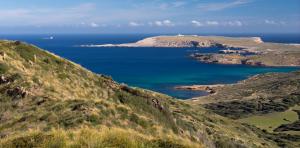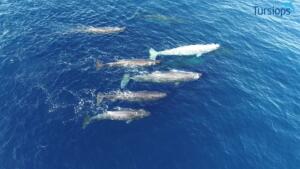
Grants
Sea
TURSIOPS | Moby Mummy 2023
1.500 € awarded
TOTAL PROJECT COST – €30.140
CLOSED
- Organisation Applying for Funding: Asociación Tursiops
- Project Duration: 7 months
- Area of Interest: Sea
- Other entities involved: Consell Insular de Menorca, Menorca Lines, Marina Port Mahón, Prezer-Adalmo.
IMPACT


THE PROJECT
Primary Impact
Helping native species to thrive
Summary of the project
Since 2003, the sperm whale population has been monitored in the Balearic Islands, an area identified as being of great importance for the species, classified as Endangered in the Mediterranean by the IUCN. The presence of both solitary males, groups of young males and social groups (mothers with calves) support the importance of the area, thus being vital for the dynamics of the species. Between 2019 and 2022, 4 campaigns have been carried out to search for and monitor sperm whales in the deep waters off the north of Menorca. The results show a significantly higher density of social groups with calves than observed so far.
Environmental Focus
The International Maritime Organisation is currently working on the creation of a PSSA (Particularly Sensitive Sea Area) with the main objective of regulating maritime transport in order to make it compatible with conservation. This area would include the Pelagos Sanctuary, the IMMA “NW Mediterranean” and the Cetacean Migration Corridor, leaving out both the IMMA “Balearic Islands Shelf and Slope” and the breeding area identified in the north of Menorca. This fact could intensify the high speed and length maritime traffic in these areas, increasing the exposure of this species to possible collisions.
Sperm whale populations are very vulnerable to anthropogenic mortality due to their life cycle: their reproductive rate is slow, as sexual maturity is delayed until they are about 11 years old and they have, on average, only one calf every 5 years. For this reason, their populations cannot withstand prolonged episodes of high mortality and the offspring are the most sensitive segment to ensure the survival of the species.
The average number of encounters of social groups around the Balearic Islands until 2020 was 32% (social groups/total encounters), while in the open waters north of Menorca it reached 95%. Currently, 220,000 vessels over 100 tonnes cross the Nostrum Sea each year. It is vital to correctly delimit the area of special interest for the sperm whale in the north of Menorca in order to avoid collisions with these vessels and the noise pollution derived from them.
It is unknown how survival with these injuries may alter the fecundity rate and associated population growth, already reduced by direct collision deaths. These collisions are considered unsustainable for the Mediterranean population and is one of the important reasons why the IUCN has listed it as Endangered. Furthermore, even if the animal avoids encounters, sperm whales, like many other cetaceans, stay away from areas of high maritime traffic density, which can cause serious conservation problems if this traffic coincides with regions of critical habitat.
Social, Economic and Cultural Outcomes
- Encouraging governments, public institutions and media to act in ways that support the natural world
- Achieving the formulation of existing legislation or helping to establish new legislation for environmental conservation and the promotion of BNS (Nature Based Solutions)
- Increased percentage of marine protected areas with management strategies in place (as defined by the UN Commission on Sustainable Development – CSD)
- Establishment of new Marine Protected Areas.